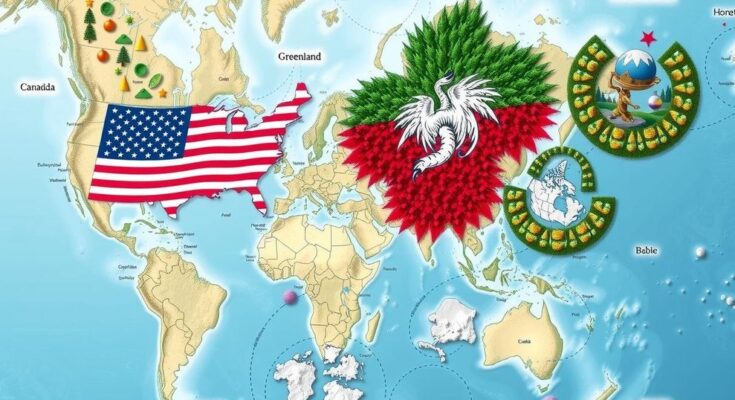President-elect Donald Trump has recently suggested American expansion into Canada, Greenland, and the Panama Canal, sparking debates about his genuine intentions and the potential implications for US foreign policy. His rhetoric indicates a nationalist agenda reminiscent of Manifest Destiny, while foreign officials firmly oppose any discussions of territorial concessions. As such, these proposals may serve as mechanisms for negotiating trade and diplomatic relations rather than serious ambitions to acquire new territories.
In a recent flurry of provocative suggestions, President-elect Donald Trump has hinted at the potential for American expansion to include territories such as Canada, Greenland, and the Panama Canal. His comments, which include entertaining the idea of making Canada the 51st state and reclaiming control of the Panama Canal, suggest a return to themes reminiscent of the 19th-century notion of Manifest Destiny. Should these ideas reflect genuine policy ambitions, they could represent significant shifts in US foreign policy and territorial aspirations.
Trump’s remarks about Canada and the Panama Canal were notably highlighted during speeches in Arizona, where he framed these territories as essential for national security and economic interests. His positioning suggests that he intends to utilize these provocations as leverage in negotiations, especially regarding trade and tariffs with neighboring countries. Additionally, Trump has reiterated his past interest in acquiring Greenland, which was dismissed by Danish officials as unrealistic.
As Trump’s transition team remains ambiguous about the seriousness of these proposals, the underlying motivations seem tied to his broader America First agenda. This agenda emphasizes national interests, particularly in trade relations, urging nations like Panama to lower taxes for American shipping vessels. However, the responses from officials in Panama and Denmark strongly refute any intent on their part to relinquish control or negotiate their territories’ status, exemplifying the stark international implications of Trump’s rhetoric.
The article discusses recent statements and proposals made by President-elect Donald Trump regarding the potential expansion of US territory. These comments come in the context of broader nationalist sentiments that aim to reposition America as a more aggressive presence in international affairs. Trump’s remarks have triggered reactions from foreign officials, indicating that these proposals are not mere political banter but could reflect an underlying strategy to redefine America’s foreign policy approach.
In summary, Donald Trump’s provocative suggestions concerning territorial expansion and national security underscore a potential shift in US foreign policy that may echo historical doctrines of entitlement to land. His remarks, while perhaps not all feasible, reflect a strategic approach aimed at leveraging negotiations with foreign leaders to bolster national interests. The dismissal by affected countries highlights the complexities and potential diplomatic ramifications these suggestions may provoke.
Original Source: www.cnn.com




